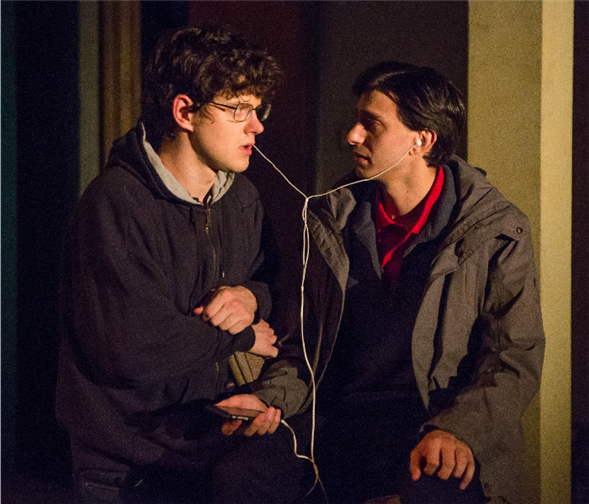Translate Page

Playwright Samuel D. Hunter and director Davis McCallum on their latest religion-tinged, Idaho-set drama
---
Before director Davis McCallum and playwright Samuel D. Hunter worked together on plays such as A Bright New Boise, The Whale, Pocatello, and The Few, the two spent time as roommates. Hunter joined a retreat with Page 73 Productions at the last minute, and McCallum received a call from the theatre company asking if he'd be okay bunking with a stranger. He didn't mind.
"I opened up the door and at the end of the room was Sam reading a book by the window, and I said, 'What are you reading?'" recalls McCallum. "In my memory, the book was called Genocide, and he said, 'I'm working on a play for the retreat about genocide,' and I remember thinking, Hmm, I wonder if that's going to be good."
Eventually it turned into Hunter's Five Genocides, which McCallum directed as part of Clubbed Thumb's Summerworks in 2010. That marked the start of a fruitful artistic partnership. Their latest collaboration is The Harvest, currently playing at Lincoln Center's Claire Tow Theater, about a group of fundamentalist Christian teenagers in Idaho preparing to go on a mission to the Middle East.
All of Hunter's plays are set in Idaho where he grew up, and many of them touch on religion. However, the dramatist says that for The Harvest he "went directly at it in a way I never have before, in really trying to make a spiritual crisis the main dramatic engine."
Hunter, who grew up Episcopalian and went to a fundamentalist Christian school, says The Harvest is "a deeply personal play." McCallum also had a religious upbringing and attended a Christian private school in Atlanta for 13 years. "Working on this play and some of Sam's other plays, I realized how formative that whole experience was for me," McCallum says.
{Image1}
And yet neither of them had experience with speaking in tongues, which is how The Harvest opens, with five teenagers practicing glossolalia simultaneously for several minutes. "I basically wrote it by just speaking tongues myself and then writing them down," Hunter says. "My question was basically: How would a group of kids in a basement in southeastern Idaho think the Bible originally sounded?"
McCallum asked the actors to memorize the scene before rehearsals started, something he has never asked a cast to do. While they had a difficult time learning the sounds, both Hunter and McCallum knew they needed to be off-book in order to explore the moment's physical and even spiritual nature. Having the actors improvise the sequence would have been a "nightmare," both agree, because then "you would have this experience of seeing actors struggle to come up with language," Hunter explains.
The two central characters also have difficulty finding words to communicate. Tom (Gideon Glick) and Josh (Peter Mark Kendall) are high school friends who may or may not be in love with each other -- like most adolescents, their feelings are confusing even to themselves. Throughout the play, they attempt to figure out their bond as Josh is planning to move to the Middle East permanently while Tom is only going for four months.
"It's tough because the moment that I say I frequently write about gay characters, I think it sort of puts it into this box," Hunter says. "I've never really been interested in writing plays that ever so neatly fit into this idea of what makes a play a 'gay play.'"
For McCallum, the challenge was to translate the ambiguousness of the characters' relationship into the physical life of the play. "We wanted there be a sense of electric charge between the two of them onstage," the director says. "But at the same time, if they were too comfortable with each other's bodies, it either started to read like the barrier that they're struggling with wasn't as formidable as it appears to them, or it would get kind of bro-y in a way that suddenly made the stakes very small. It's most compelling if internally -- some place they can't even articulate to themselves, much less to each other or the rest of the world -- they're aware that they're in love with the other person."
Although The Harvest's setting and themes are reminiscent of many of his plays, Hunter doesn't plan to stop writing about characters grappling with identity and faith any time soon.
"The more that I do this, the more that it just feels like this is a project that isn't about any one play -- it's about a body of work," he says. "In grad school, I was like, 'I have to reinvent myself with every play!' The more that I calmed down about that, the more I enjoyed the way the plays are in conversation with one another. And I think that's what keeps me going, too, because it's not about trying to write the best play ever. It's more about a larger project, something that I think is hopefully more meaningful than just a single hour and 40 minutes of theatre."
---
Follow Suzy Evans at @suzyeevans. Follow TDF at @TDFNYC.
Photos by Jeremy Daniel. Top image: Peter Mark Kendall and Gideon Glick.
TDF MEMBERS: Browse our discounted tickets to theatre, dance, and concerts.